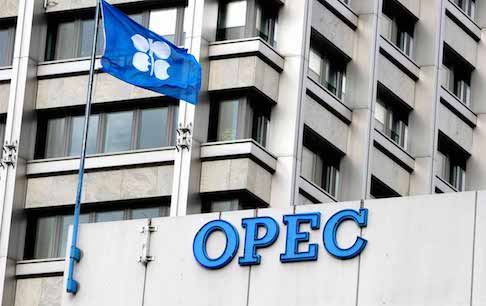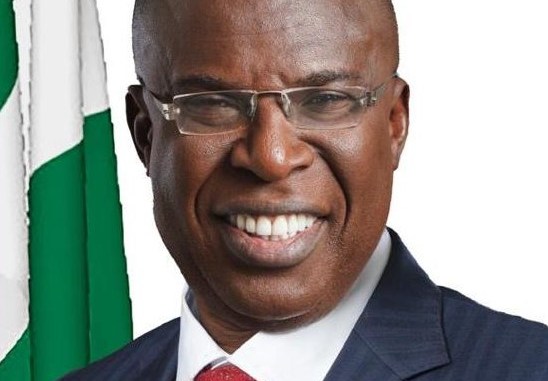Oil & Gas
OPEC Cuts 2022 Oil Demand Over Economic Concerns

By Joseph Amah, Abuja
The Organisation of Petroleum Exporting Countries has revised the demand for crude oil in 2022 downward following the concerns around global economic growth.
OPEC’s Secretary-General, Sanusi Barkindo, announced this at the 62nd Meeting of the Joint Technical Committee via videoconference.
He also stated that the loss of crude oil and other liquids exports of more than seven million barrels per day from Russia could not be replaced, as this was rippling through energy markets.He said, “Global oil demand growth for 2021 remains similar to last month, at 5.7 million barrels per day, but 2022 growth has been revised down by 0.
5mb/d to stand at 3.7mb/d. This mostly reflects the downward revision in world economic growth.“On the supply side, non-OPEC supply growth in 2022 has been revised down by 0.3mb/d to 2.7mb/d, mainly on the back of a downward revision for Russia.”Barkindo noted that given the uncertainties on the supply side, and that OPEC-10 crude oil spare production capacity stood at around 3.3mb/d, or roughly 3.3 per cent of global demand, it was positive to hear last week that the Caspian Pipeline Consortium was set to resume full exports after almost 30 days of disruptions following repairs on one of its key loading facilities.
“The CPC pipeline carries around 1.2mb/d. In terms of the Declaration of Cooperation and the production adjustments, the latest data shows that our conformity levels reached 157 per cent in March, and stand at 113 per cent overall since May 2020,” he stated.
The OPEC scribe added, “As of March 2022, participating countries were producing 2.37 million barrels more on a daily basis than in August of 2021. Some countries continue to produce under their agreed levels, with the shortfall at 1.45mb/d in March.”
Meanwhile, Barkindo noted that it was now clear that Russia’s oil and other liquids exports of more than 7mb/d could not be made up from elsewhere.“The spare capacity just does not exist,” he stated, adding, “however, its potential loss, through either sanctions or voluntary actions, is clearly rippling through energy markets.“The crises we face are causing huge volatility, with daily price swings of more than $5/b occurring on 13 occasions across March and April.”
He further stated that recent events and developments in the oil industry showed the continuing shift among policymakers to a better understanding of what was required in the energy transition.
“It is not about moving from one energy to another; it is about utilising all available energies and understanding the energy security dimension of our future to enable the necessary investments,” he stated.
Barkindo added, “This was clearly highlighted last month by US investment bank, JP Morgan in its first annual energy outlook.“It said the world needs to find $1.3tn of incremental investment by 2030 to boost all types of energy output and infrastructure from renewables to oil and gas to avoid an energy crunch. What we are seeing is a wake-up call to all stakeholders.“We need to ensure there is a clear pathway for all energy investments. Sustained investment in oil is required if we are to expand production and ensure adequate spare capacity, a vital cog in the oil market landscape.”
NEWS
NGEP Urges Gas Reticulation In Buildings

By Olasunkanmi Onifade
Abuja, April 29, 2025 The National Gas Expansion Programme (NGEP) has called on stakeholders to promote the integration of gas reticulation systems in estates, districts, and industrial areas, following best practices seen in developed countries.
Chairman of NGEP, Prof.
Mohammed Ibrahim, made the call on Tuesday during the Builders’ Conference and Annual General Meeting of the Nigerian Institute of Building (NIOB), FCT Chapter, in Abuja.The conference, themed “Gas Reticulation in Building: Design, Safety, Environmental Compliance and Prospects for Builders,” focused on enhancing energy infrastructure in Nigeria’s built environment.
Ibrahim noted that with Nigeria’s vast natural gas reserves, gas reticulation offered a sustainable solution to improve energy accessibility, affordability, and reliability in homes and businesses.
“Gas reticulation in buildings presents a compelling pathway to a more sustainable, efficient, and resilient built environment.
“By prioritising sound design principles and ensuring strict adherence to safety and environmental standards, we can unlock the full potential of natural gas to drive progress,” he said.
He highlighted the key benefits of gas reticulation, including energy efficiency, cost effectiveness, versatility, and reliability.
Also speaking, the Chairman of the Council of Registered Builders of Nigeria, Samson Opaluwah, stressed the importance of capacity building for safe and efficient gas distribution.
He said this involved training engineers, technicians, and other professionals in system design, installation, and maintenance, while also strengthening regulatory frameworks and encouraging local innovation and manufacturing.
The Chairman of NIOB, FCT Chapter, Usman Okehi, emphasised the growing need to incorporate gas systems in residential, commercial, and industrial developments across Nigeria due to rising energy demands and gas availability.
According to him, with this advancement comes the need for strict adherence to design standards, rigorous safety protocols, and full environmental compliance.
“It is our responsibility as professionals and regulators to ensure these systems are functional, safe, and environmentally sound,” Okehi said.
He described the conference as a platform where stakeholders could explore the evolving landscape of gas infrastructure in building projects, share best practices, examine safety and environmental considerations, and assess future opportunities for builders in the sector.
The News Agency of Nigeria (NAN) reports that the Nigerian Institute of Building is the professional body for builders in Nigeria. It traces its origins to the Builders’ Society, established in London in 1834.
Oil & Gas
FG Inaugurates Committee to Enhance Gas Distribution in Urban Buildings

The Ministry of Petroleum Resources has inaugurated a Technical Working Group to enhance gas reticulation practices in Nigeria’s building industry.
The ministry’s Permanent Secretary, Amb. Nicholas Ella inaugurated the Technical Working Group (TWG) between the National Gas Expansion Programme (NGEP) and the Council of Registered Builders of Nigeria (CORBON) on Wednesday.
Reports= says that reticulation refers to the process of creating a network of pipes or tubes to distribute gas or other utilities to buildings or industrial sites.
The permanent secretary restated the importance of creating energy smart cities, saying that modern urban development relies on efficient gas and utility distribution systems,
“Most modern cities in developed countries have evolved to energy smart cities where energy, specifically gas and other utilities are piped to districts and estates.
“However, one of the key tools in creating energy smart city is the National Building
Code which, in essence, sets the guidelines on Building Pre-design, designs, construction and post-construction stages,” he said.
The permanent secretary reiterated the benefits of reticulated gas systems for households and businesses alike, adding that it ensured metered supply akin to water and electricity,
According to him, it eliminates the need for cumbersome refills, and also enhances safety by burying pipes and incorporating advanced safety equipments.
“The TWG is tasked with designing a comprehensive policy to implement best practices for gas reticulation using LPG, PNG, and Bio-Gas across Nigeria’s building sector.
“Key responsibilities include reviewing the current National Building Code, examining global gas distribution systems, and proposing quality standards for materials used in gas installations,” he said.
The permanent secretary emphasised the need for rigorous safety protocols and guidelines to ensure the efficient and safe use of gas in construction.
He urged the group to prioritise environmental sustainability in its recommendations, adding that the group is expected to submit its report by Nov. 15.
Earlier, Mr Samson Opaliwah, the Chairman of CORBON. expressed the council’s commitment to collaborate with the group to ensure safe uptake of gas for use in houses and housing estates in Nigeria.
“I assure you of the williness of CORBON to leverage the expertise and resources at her disposal to ensure that steps are put in place for gas infrastructure in buildings and estates.
“The gas infrastructure will be safe, sustainable and world-class.
” Our collective efforts will yield clear, standardised guidelines for safe and effective gas systems in buildings, matched with a skilled workforce to meet growing demands in Nigeria,” he said. (NAN)
Oil & Gas
Utilise Oil, Gas Industry Report as Tool for Public Debate – NEITI

The Nigeria Extractive Industries Transparency Initiative (NEITI) has urged stakeholders to utilise its 2022/2023 oil and gas report for civic engagement, constructive dialogue, and public debate.
Executive Secretary of NEITI, Dr Orji Ogbonnaya Orji, made the call at the report’s public presentation on Thursday in Abuja.
The report was unveiled by Mr Ola Olukoyede, Chairman, Economic and Financial Crimes Commission (EFCC), alongside Sen.
George Akume, Secretary to the Government of the Federation and Chairman, NSWG, NEITI and other dignitaries.Orji emphasised the report’s significance in guiding policy, encouraging public debate, and improving governance in natural resource management.
He highlighted the report’s comprehensive data on revenues, governance structures, operations, and compliance within the oil and gas sector.
Speaking at the public presentation of the report, Akume reaffirmed the Federal Government’s commitment to transparency principles.
Olukoyede pledged to investigate the report’s findings and recommendations, noting that NEITI’s previous reports led to the recovery of over N1 billion.
The report is available on NEITI’s website, providing valuable insights into the sector’s performance and challenges.
The presentation was attended by Chairmen of National Assembly Committees, captains of industries, members of diplomatic missions, development partners, civil society organisations and the media. (NAN)






















